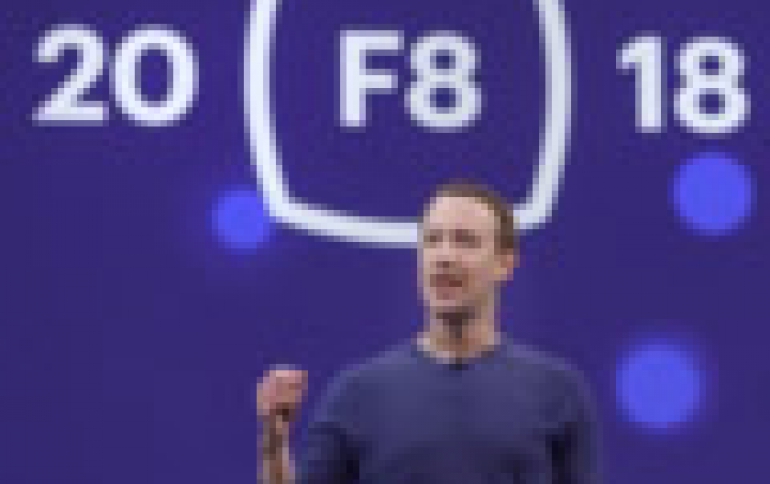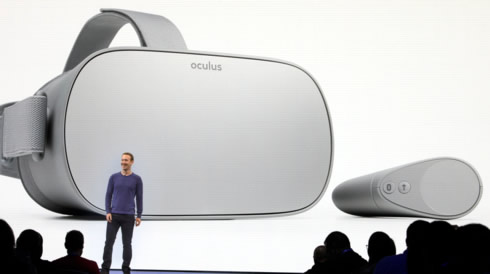
F8 2018: Oculus Go VR, Clear History, Better Instagram and Whatsapp Features and New Ways to Date
Better privacy tools, new features for Whatsapp and Instagram and the new sub-$200 Oculus Go VR headset were just some of the new initiatives that shared the stage during the first day of Facebook's F8 developers conference.
Privacy tool 'clear history'
Facebook announced plans to build Clear History. This feature will enable you to see the websites and apps that send Facebook information when you use them, delete this information from your account, and turn off Facebook's ability to store it associated with your account going forward.
Apps and websites that use features such as the Like button or Facebook Analytics send Facebook information. Facebook says it uses this information "to make your experience on Facebook better."
If you clear your history or use the new setting, Facebook will remove identifying information so a history of the websites and apps you've used won't be associated with your account. However, Facebook will still provide apps and websites with aggregated analytics.
Oculus Go Available Now for $199
Oculus Go, Facebook's first standalone headset, is now available at oculus.com in 23 countries. Starting at $199 USD, Oculus Go is comfortable, lightweight device is launching with 1,000+ apps, games, and experiences.

Oculus Go is combining the best lenses of any Oculus headset to date with built-in spatial audio and an optimized software stack.
Unlike the PC-connected Oculus Rift, the device won't let you walk around or grab things. In fact, it's exactly like those VR headsets for phones, the Samsung Gear VR and Google Daydream View. Except, this time, you don't need to connect anything else at all, after you've set it up with your phone, at least.
All the hardware, screen, processor and everything, are inside the headset. And the functional pistol-grip Oculus controller is included in the box.
The headset has a 5.5-inch, 2,560x1,440-pixel LCD display.
There's no support at all for external game controllers: You can only use the included remote. And because it lacks more advanced full-room tracking with onboard cameras (six degrees of freedom, aka 6DOF), which lets you "lean in" to VR, it means the Oculus Go's VR apps feel a lot more static.
Dating service
Facebook will also offer its first dating service, Chief Executive Mark Zuckerberg said on Tuesday, essentially returning to the roots of social networking.
Zuckerberg told software developers at Facebook's annual F8 conference that a dating service would be a natural fit for a company that specializes in connecting people online.
"There are 200 million people on Facebook that list themselves as single, so clearly there's something to do here," Zuckerberg said.
Facebook users have been able reveal on the network whether they are single or in a relationship since it first went live in February 2004.
Zuckerberg said Facebook was building the dating service with an emphasis on privacy, a sensitive subject for people who use online dating and for Facebook as the company reels from a scandal over its handling of personal information.
A dating service could increase the time people spend on Facebook.
A prototype displayed on screens at the F8 conference showed a heart shape at the top-right corner of the Facebook app. Pressing on it will take people to their dating profile if they have set one up.
The prototype was built around local, in-person events, allowing people to browse other attendees and send them messages.
It did not appear to have a feature to "swipe" left or right on potential matches to signal interest, as Tinder and other established services have.
The feature will be for finding long-term relationships, "not just hook-ups," Zuckerberg said. It will be optional and will launch soon, he added, without giving a specific day.
Facebook Chief Product Officer Chris Cox said in a separate presentation that the company would share more over the next few months.
People will be able to start a conversation with a potential match by commenting on one of their photos, but for safety reasons, the conversations will be text-only, Cox said.
Use of Augmented reality to draw ads to Messenger app
Facebook's Messenger app launched an augmented reality feature on Tuesday to allow people to see products they are shopping for as if they already have them, such as a car parked in a driveway, in a move aimed at drawing in potential advertisers.
Facebook has said that targeting the 1.3 billion people who use its Messenger service with ads will be an important part of the company's long-term revenue growth.
Facebook is launching a new toolkit for software developers to make augmented reality features.
David Marcus, head of Facebook's Messenger app, said that shoppers will be able to visualize and potentially test out products that advertisers have made available. Sephora, one of the first businesses that will use the feature, will let people virtually try on cosmetics.
Similar augmented-reality features have proliferated on the apps of retailers such Amazon.com Inc and Ikea, which allow people to see how a toaster or couch would look in a room.
Facebook has been encouraging businesses to use Messenger to talk with consumers, sometimes for customer service.
Having businesses using Messenger helps Facebook's advertising business, Marcus said. Marketers can place ads directly in the service, and Facebook sells ads in its News Feed that connect to Messenger conversations.
Messenger and the News Feed create a feedback loop like a "flywheel" for ad sales, Marcus said.
Four businesses are participating in the launch: Asustek Computer Inc, automaker Kia Motors Corp, clothing company Nike Inc and Sephora, a unit of LVMH Moet Hennessy Louis Vuitton SE.

Facebook also announced that buyers and sellers in Marketplace, a place on Facebook to buy and sell things locally, will be able to communicate across languages with M suggestions for translations. Now when people who connect through Marketplace receive a message in a language that is different from their default language in Messenger, M will ask if they want to translate the message. At launch, translations from English to Spanish (and vice-versa) will be available in Marketplace conversations taking place in the US. Facebook plans to expand this feature and gradually roll out M suggestions for translations to people using Messenger in the US in the coming weeks.
Sharing to Stories
Facebook is introducing a new way for people to share from their favorite apps to both Facebook and Instagram Stories.
People already share their interests on our platforms, and now Facebook is making that experience faster, easier and more creative on Stories.
Just tap the share button in an app like Spotify to share what you're listening to directly into the camera. From there you can edit and share to your story or feed. You don't have to connect your Facebook or Instagram account to other apps in order to share to Stories.
Groups
Facebook is introducing the Groups tab, which helps you navigate to your existing groups more easily and interact with content from all your groups. Later this year, you'll be able to discover and join new groups through the tab.
Last year at F8 Facebook announced the AR camera platform, and today the company is bringing it to Instagram. Using AR Studio, creators will be able to design unique, interactive camera experiences, including face filters and world effects, for their followers on Instagram.
Video Chat
Facebook announced video chat, a new way people can use real-time video to connect, even when they can't be together. Video chat will be available in Instagram Direct and will empower both one-on-one and group conversations.
New Explore
Facebook has redesigned Explore to make it easier to discover things you're interested in. The new Explore will organize suggested content into relevant topic channels, making it easier to browse across your interests, while going deeper into any specific area.
Video chat and the new Explore are both testing now and will soon be rolling out globally.
WhatsApp Group Calling and Stickers
Voice and video calling are very popular on WhatsApp, and Facebook shared that group calling will be coming in the months ahead. Stickers are also coming to WhatsApp soon.
More Immersive Ways to Share
Recently, Facebook introduced 3D posts and today, the company announced that people will soon be able to take 3D objects from News Feed into Facebook Camera AR experiences with one tap. The company also announced 3D Photos, coming this summer- this is a new media type that lets people capture 3D moments in time using a smartphone and share on Facebook.





















